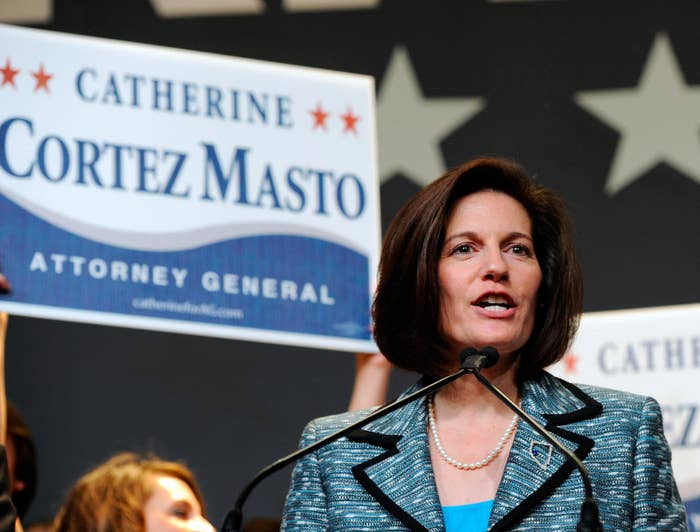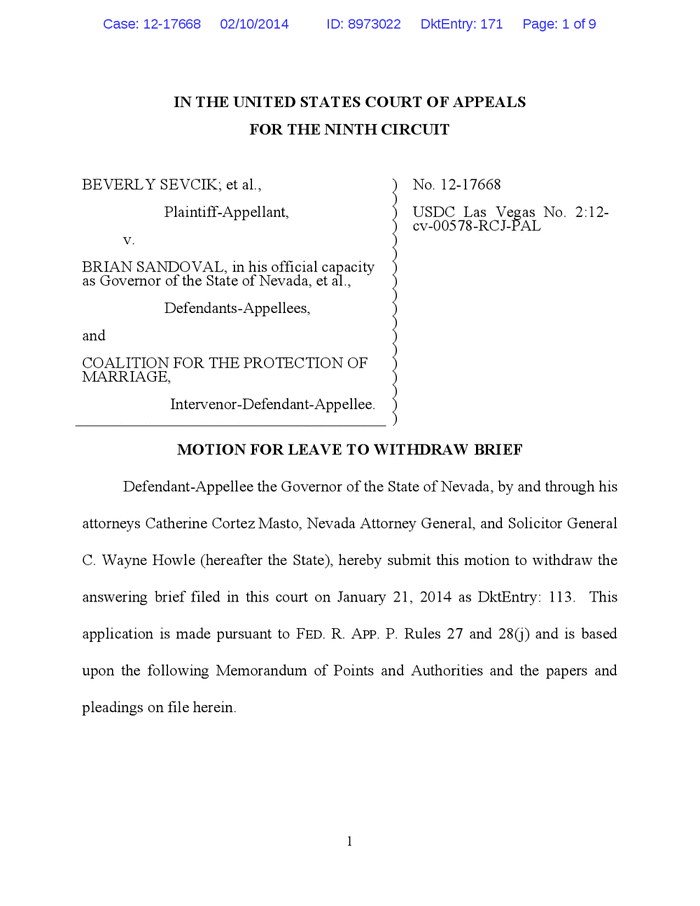
WASHINGTON — Nevada state officials will no longer defend the state's amendment banning same-sex couples from marrying against legal challenge, both the governor and attorney general's offices announced Monday.
The decision comes in the context of an ongoing challenge to that marriage amendment that is currently before the 9th Circuit Court of Appeals. Nevada Attorney General Catherine Cortez Masto is seeking to withdraw a previously filed defense of the marriage amendment in that case.
"When the Federal District Court decided this case in November 2012, the law regarding treatment of same-sex couples under traditional marriage laws was uncertain," she said in a statement. "But the legal landscape has since changed."
The court filing at the 9th Circuit Monday states that the filing is made on behalf of Gov. Brian Sandoval, the named defendant in the case. Cortez Masto is a Democrat, and Sandoval is a Republican.
A spokeswoman for Sandoval, Mary-Sarah Kinner, told BuzzFeed Monday evening, "Based upon the advice of the Attorney General's office and their interpretation of relevant case law, it has become clear that this case is no longer defensible in court."
The decision by government officials in Nevada to stop defending the state's marriage ban is a dramatic change for the case, the result of another recent decision from the 9th Circuit about what level of review courts should give to laws and government policies that classify people based on sexual orientation.
Cortez Masto said in her statement that the decision "sets a new standard of review for cases in the Ninth Circuit." In that case, involving jury selection, the 9th Circuit held in SmithKline Beecham v. Abbott Laboratories that "heightened scrutiny" would be given to constitutional challenges to government classifications based on sexual orientation — a decision Cortez Masto determined, as had most legal commentators, would apply to the challenge to Nevada's marriage amendment.
"After thoughtful review and analysis, the State has determined that its arguments grounded upon equal protection and due process are no longer sustainable," Cortez Masto said in Monday's statement.
In the filing, the state discussed the effect of the Supreme Court ruling in United States v. Windsor striking down part of DOMA on the Nevada case. The state argues that "in all candor it appears that Windsor, viewed through the SmithKline lens, is dispositive" — meaning that the Supreme Court's decision striking down DOMA, if sexual orientation classifications now receive heightened scrutiny, also means that state amendments like the Nevada marriage amendment are unconstitutional.
The 9th Circuit does not, however, need to allow Cortez Masto to withdrew the state's brief. When the Department of Justice stopped defending the Defense of Marriage Act in 2011, for example, the 1st Circuit Court of Appeals refused to let the Justice Department withdraw its defense of the law. It did, though, allow the Justice Department to file another, superseding brief to allow it to explain its new view that DOMA is unconstitutional.
The other named defendant, the Clark County Clerk of Court, previously had decided not to defend the amendment on appeal. The Coalition for the Protection of Marriage, which had backed the amendment proposal and intervened to defend the measure, continues to defend it on appeal.
The status of the Nevada challenge differs from other marriage suits because the plaintiffs here lost at the trial court, so they — and not the state — brought the appeal. As such, their appeal would continue at this point.
Asked whether the state officials here will seek to file another brief if the court allows the brief defending the amendment to be withdrawn, a spokeswoman for Cortez Masto told BuzzFeed only, "[T]he case will continue on in ordinary court before the 9th Circuit."
Should the plaintiffs win at the 9th Circuit, however — as the Nevada officials now appear to believe will happen — then the situation could become more complicated. If none of the government officials, unwilling to defend the law now, would be willing to seek to appeal the ruling to the Supreme Court, then it would appear to set up a situation similar to that which happened in the case challenging California's Proposition 8 where the Supreme Court held that an outside group who backed an amendment does not have standing to seek an appeal.
This article was updated as more information became available, with the final update made at 11 p.m. on Feb. 10.
Update, Feb. 12: The court granted the request to withdraw the brief in a one-sentence notice in a filed order: "Appellee Brian Sandoval's motion to withdraw the previously filed answering brief for case No. 12-17668 is granted."

